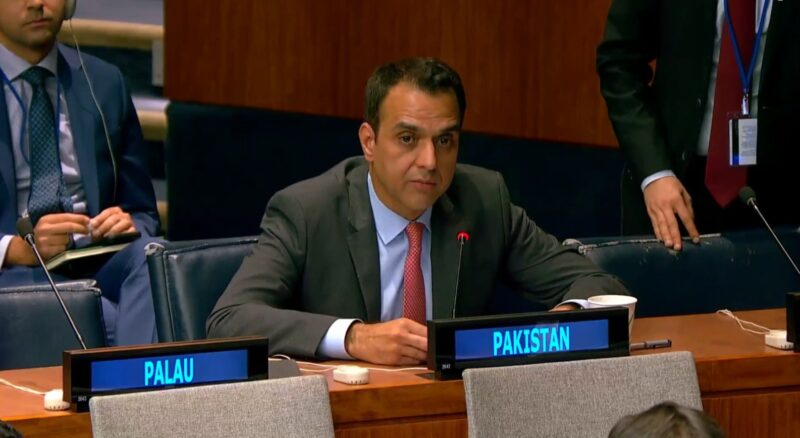
NEW YORK While reiterating its commitment to the goal of a nuclear weapons free world, one that is achieved in a universal, verifiable and non-discriminatory manner, Pakistan has emphasized the importance of acknowledging the link between nuclear disarmament and the legitimate imperatives, which drive states to acquire these weapons in the first place.
Delivering a national statement during the thematic debate on nuclear weapons in the First Committee today, Ambassador Usman Jadoon, Deputy Permanent Representative of Pakistan to the United Nations, drew the world’s attention to such drivers, which include threats from larger military forces, existence of unresolved disputes, absence of effective security mechanisms, and lack of implementation of the UN Charter and its resolutions.
Ambassador Jadoon referred to the example of India, which is responsible for introducing nuclear weapons in South Asia, nuclearizing the Indian Ocean, and has refused to commit to non-testing, and is on record as having threatened aggression against Pakistan. New Delhi, he said, also continues to defy the implementation of resolutions on Jammu and Kashmir in addition to having the ambition of being on UN Security Council as a permanent member.
Ambassador Jadoon stated that the time to pursue the current approach to the Fissile Material Cut-Off Treaty (FMCT) has long passed. He said that a treaty that only halts future production without addressing existing fissile material stockpiles is unacceptable, adding that such a proposal would perpetuate global imbalances and fail to contribute meaningfully to nuclear disarmament.
The Pakistan deputy UN envoy said if the advocates of the FMCT are truly committed to addressing fissile material production, they must reject double standards and halt nuclear cooperation with a South Asian country that continues to amass stockpiles outside of international safeguards. He said that without this clarity, calls for a moratorium or a cut-off treaty lack credibility.
Pakistan further emphasized that, until nuclear disarmament is achieved, the negotiation of a legal instrument assuring non-nuclear weapon states protection against the use or threat of nuclear weapons remains a critical priority.
Ambassador Usman Jadoon said that Pakistan advocates for an international convention on Negative Security Assurances (NSAs) to reduce global nuclear risks and enhance security in today’s tense geopolitical climate. Delaying progress on NSAs while tying them to unrelated areas is unjustified, he added.
He said that Pakistan will present its draft resolution on NSAs and looks forward to broad international support in this First Committee session,
Ambassador Jadoon also expressed deep concern over the increasing role of nuclear weapons in military doctrines and the growing risks of major conflict escalation. He said the largest nuclear-armed states, despite their disarmament obligations, are modernizing their arsenals and showing reluctance to negotiate new arms control agreements. He said that the alarming calls for further expansion of nuclear stockpiles are now being heard.
The Pakistani delegate said that the ongoing weaponization of emerging technologies, integrated with nuclear capabilities, has complicated the global security landscape, worsened asymmetries and is undermining disarmament efforts. He said that additionally, states with excess fissile material are advocating for superficial measures, such as capping, as a diversion from meaningful disarmament.
While sharing the long-standing disappointment over lack of fulfilment of nuclear disarmament obligations, he reiterated the need for intensifying efforts in addressing the security concerns of states, which force them to pursue measures for self-defence.

Comments are closed.